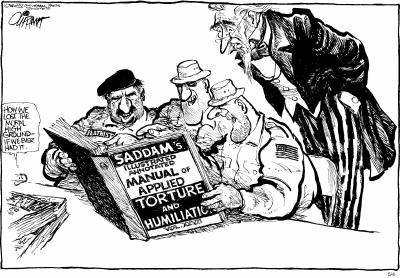Issue Date: May 14, 2004
When President Bush appeared on Arab television to express his sorrow over the abuse of Iraqi prisoners, his intent was undoubtedly sincere, but the result was one more less than credible attempt to make the war match his sense of what should be. In what has become the familiar cadence of oversimplified analysis, he repeated his abhorrence at what he saw, but he never outright apologized and he turned the sessions into an opportunity to pitch his view of America. So much of what is happening in Iraq it seems is not representative of what America stands for, or what we want to see happen on the ground, or how we envisioned the war and occupation unfolding. At times the administration appears downright petulant that Iraqis aren’t more appreciative of what we really want to do for them. It becomes clearer each day that the war in Iraq, product of deception from the start, cannot withstand the weight of truth. President Bush, so confident of purpose, a man whose certainty runs to knowing the intent of the Almighty, is discovering that platitudes disintegrate under the pressure of facts and in the harsh light of reality. While the administration has successfully spun its version of its Mideast miscalculations so fervently that now even supposedly dispassionate media regularly lump Iraq in with the war on terror, the fact is there was no connection at the outset. Any links that now exist were created largely by backlash to the U.S. occupation and the opening the occupation provides to outside opportunists. There were, we now all know, no weapons of mass destruction. If the administration verges on truth it is in the one-line mantra that now sums up the war’s rationale: The world is better off without Saddam Hussein. It is an unarguable assertion. On the other hand, the world would be better off without a formidable list of bloody dictators, but worse off for any invasions that might occur to accomplish such goals. The distressing irony in our current situation is that having rushed to remove a dictator we have essentially alienated ourselves from the other countries and the strategies that could have fashioned a more effective effort to fight terrorism. Now we are forced to backtrack and beg alliances. The only real hope for anything constructive in Iraq is reintroducing the United Nations to the situation, but this time with real purpose and authority. Secretary of State Colin Powell made the surprising comparison this week between the torture by Americans of Iraqis at Abu Ghraib prison and the slaughter of civilians by Americans in My Lai, Vietnam, adding that in war horrible things happen. An essential insight is carried inside that understatement. In his book, War Is the Force that Gives Us Meaning, New York Times reporter and veteran war correspondent Chris Hedges understands that something deeply transforming and unsettling occurs in both the situation in which the horror is possible and in the horror’s aftermath. “States at war silence their own authentic and human culture,” he writes. “When this destruction is well advanced they find the lack of critical and moral restraint useful in the campaign to exterminate the culture of their opponents.” No matter how much we talk of the Geneva Conventions or how much Bush protests that the actions at Abu Ghraib “do not represent what America stands for,” losing critical and moral restraints is essential to the conduct of war. “By destroying authentic culture -- that which allows us to question and examine ourselves and our society -- the state erodes the moral fabric. It is replaced with a warped version of reality. … All is dedicated to promoting and glorifying the myth, the nation, the cause.” Those in the Arab world reportedly were not impressed with Bush’s performance. They want more than words. So do many in the United States. The report that Secretary of Defense Donald Rumsfeld apparently had no time to read indicates that the abuses are systemic. Really delving into that report might be revealing of what happens to even the American character in time of war. It is time to stop dealing in deceptions. National Catholic Reporter, May 14, 2004 |
